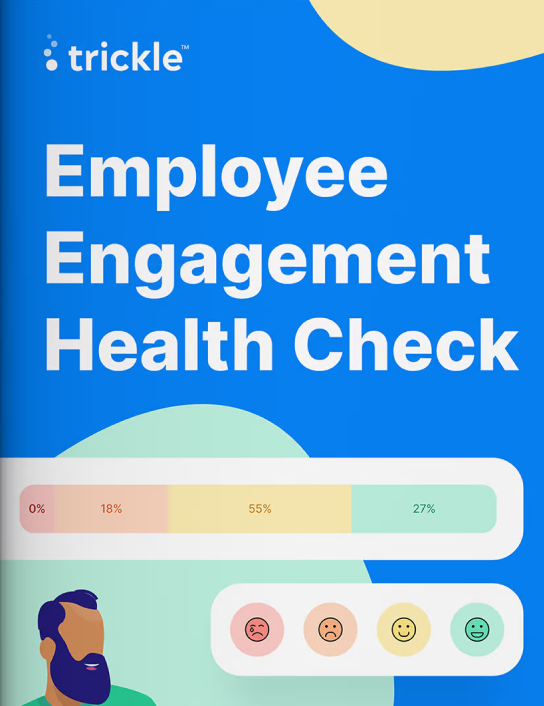How well does your company engage its employees?
Take your health check and find out.


Sophie is a speaker, author and authority on Future-of-Work issues. She has held senior management, strategy and finance roles around the world and worked for companies such as IMG and Yahoo. Sophie recently sat down with Trickle to discuss the need for more empathy in the workplace.
Over the past 20 years, technology has revolutionised the way we work and the pace of change is accelerating faster than ever before.
The possibility of flexible or remote working has been driven by evolving technology and greater interconnectedness. These developments have not only changed the way we work, but also how we need to work.
Although some workplaces have been slow to embrace these new possibilities, the arrival of the Coronavirus pandemic has forcibly ushered in a new era of working from home and compelled business leaders to consider the future of working sooner than anticipated.
Had the Coronavirus pandemic not made remote working mandatory, it could have taken a lot longer for business leaders to seriously consider rolling out flexible and remote working options.
Now, after nearly over a year and half of compulsory remote working, and as we face an imminent return to work, leaders are being urged by HR experts to start considering how they will move forward and what the ‘new normal’ will look like.
Sophie, a champion for building better, more human-centric workplaces, advocates that managers and business leaders take this opportunity to embrace a more empathic style of leadership.
Rigid leadership that clings to the old adage, ‘this worked before and this is how we’ve always done it’ or an unwillingness to adapt, isn’t going to be conducive to business success in the future, Sophie explains.
“We need to move away from the dated mindset of you pay someone and they work, and that’s the deal. We’ve now seen that this gets employees to show up but doesn’t get them to do their best work, they aren’t engaged and won’t go above and beyond, which is what we need now.
“Things are moving much faster and – pandemic aside, the business landscape is less predictable and more uncertain. Also, organisations now receive customer feedback faster than ever before, which means businesses need to adapt in a different and more agile way.
“We need more out of employees and leaders need to step up to the plate. So, we need to be proactively breaking down silos and bringing people together who have different mind-sets from different disciplines to share their point of view. The key to achieving this is more empathy in the workplace and empathetic leadership.”
Understanding and empathy go hand in hand and are essential for building workplaces where employees are healthy, engaged and productive.
Employers can often struggle to come to grips with new ways of working, but the solution is empathy, “put yourself in their shoes and try to work it out,” Sophie urges.
“The best work policies come from within and thinking about your people as individuals and understanding they may need different things to be at their best e.g. some are morning people, while others are more productive in the evening.”
Taking a one-size fits all approach is limiting and unlikely to have the desired effect, “without empathy it is hard to know what employees are really saying and what they need,” she adds.
“The pandemic has brought us into each other’s home and really highlighted that we are all three dimensional individuals that have whole personalities. This understanding has allowed us to connect in different ways.”
When times are tough or disagreements arise, it’s these bonds combined with greater empathy that enable employees to continue working together, “people are more willing to try and see it from the other person’s perspective because they have other things they are on the same page about, which is why empathy is so important now, ” she explains.
Similarly, the shared pandemic experience has helped us become more empathetic because we can recognise and acknowledge the same emotions we are experiencing in others and can show greater sympathy for the person as a result.”
Sophie anticipates that once the euphoria of being back in the office wears off, people will want things to change. Workforces everywhere have now had a taste of more flexible working and are unlikely to be satisfied with just going back to how things were.
“There will be quite a lot of confusing dynamics as people try and work out the future of work, but this can be avoided if business leaders start planning now and collaborating with their people to find the best solutions.”
“If you are not going to be an empathetic leader, you’re not going to be able to move fast enough to get the responsiveness you need out of your people,” she warns.
“People have different ways of optimising their work. We need to think about how we can help people to work at their optimal capacity, be more comfortable, less distracted and more productive,” she continues.
“It is easier for many managers just to have people back in the office, but it’s not really empathising with the people who are working for you. Companies that don’t adapt and don’t offer those options are going to lose their top talent, they won’t attract the right people or get the best out of their workforce.
“Leaders need to set an example by showing more empathy and rewarding those who exemplify it, so that employees can model this behaviour.”
Creativity, entrepreneurship, collaboration, productivity and employees thrive when there is more empathy and understanding in the workplace.
Learn more about how empathetic leadership can benefit your business and how it’s shaping the future of work.
You can follow Sophie on Twitter and Linkedin or visit:
www.sophiewade.com and empathyworks.learnworlds.com
Our CEO, Paul Reid, recently appeared as a guest on Sophie’s Transforming Work Podcast where they discussed triggering trust and engagement through anonymity and action. Tune in below as Paul Reid shares how his early employment experiences taught him to build trust-based, thriving cultures and how those learnings have been encoded into the software that powers Trickle.